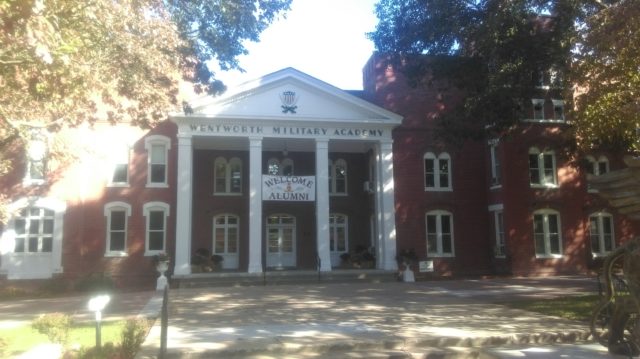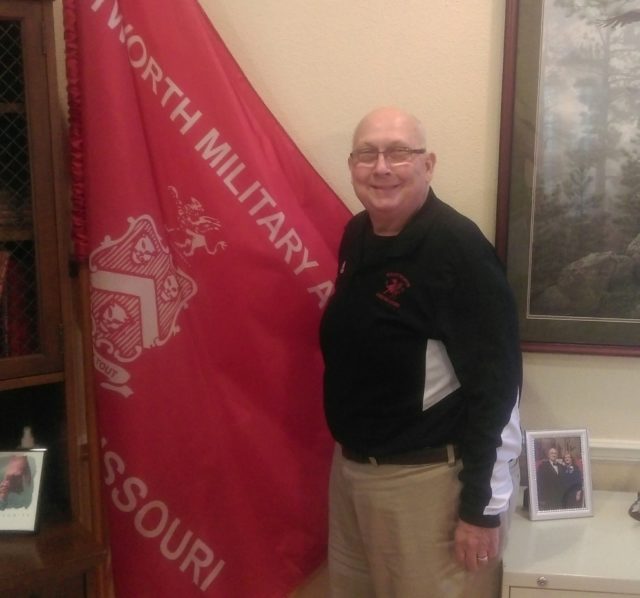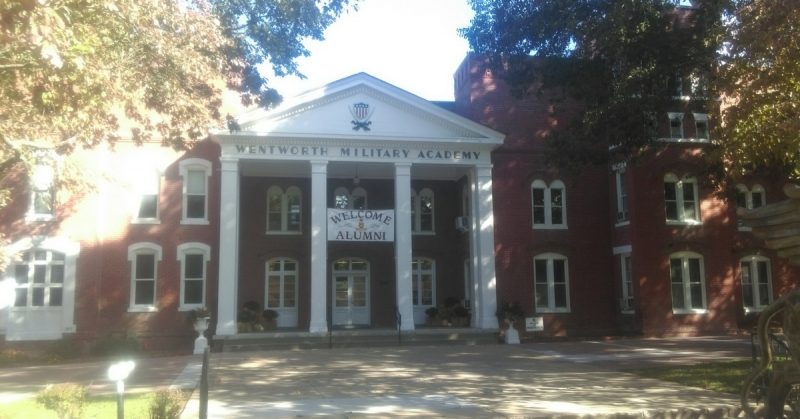War History online proudly presents this Guest Piece from Jeremy P. Ämick, who is a military historian and writes on behalf of the Silver Star Families of America.
Lexington, Mo., is home to many revered events from our state’s history, the most recognizable of which was the Battle of the Hemp Bales—a large Civil War battle between the Union Army and the Missouri State Guard in September 1861. Less than two decades later, however, Lexington experienced another historic occurrence with the establishment of Wentworth Male Academy.
“Stephen Girard Wentworth was born in Massachusetts in 1811 and moved to Lexington in 1840, where he engaged in various types of businesses like real estate,” said Col. Richard Cottrell, Senior Vice President for Enrollment Management at Wentworth.
Cottrell added, “Wentworth’s only son, William, died at the age of 27 in 1879 and he decided that he wanted to bestow some kind of public benefaction as a memorial to his son. He purchased the New Presbyterian Church at the southwest corner of 18th and Main as the first school building and opened the Wentworth Male Academy in the spring of 1880.”
According to the book “The Story of Wentworth” by Raymond W. Settle, the board of trustees for the academy was established in 1881 and it became a military school in 1882 after Principal Sandford Sellers “observed from an upstairs window of the school building” students marching in formation, conducting the military manual of arms using broomsticks borrowed from local citizens.

The book goes on to explain that the principal deemed this to be “the solution for the problem of exercise and discipline” for the students and led to the approval of a military educational structure by the board, in addition to the purchase of uniforms and guns for the students. Eight years later, in 1890, the school’s name changed from Wentworth Male Academy to Wentworth Military Academy.
In later years, the academy grew with the construction of barracks and halls, including the addition of the junior college in late 1923. The academy was incorporated as a non-profit educational entity in 1951, explained Col. Cottrell.
“Another big turning point in the academy’s history came during the 1993-1994 school year; that is when Wentworth admitted the first female students.,” said Cottrell. “Prior to this, the only way a female could attend was as a day student and they had to be the daughter of an employee.”
Although the academy has embraced several military programs during its existence, one with demonstrated impact is Wentworth’s partnership with the Air Force Academy and the Falcon Foundation, which offers academically talented students a one-year scholarship at Wentworth that leads to an appointment at the United States Air Force Academy.
This first Falcon Scholarship class was established for the 1971-1972 school year, said Col. Cottrell, and included a cadet by the name of Mark A Welsh III, who recently retired as a four-star general and served as the 20th Chief of Staff of the U.S. Air Force.
Also on the list of notable former Wentworth cadets are two Medal of Honor recipients—George B. Turner, a Texas native who served with the 14th Armored Division during World War II and William Edward Adams, a Wyoming native who was killed while serving with the Army during the Vietnam War.

Cpt. Dillon Harp, who serves as an admissions counselor at Wentworth, noted that one of the academy’s hallmark programs—the Early Commissioning Program (ECP)—provides students with a clear path to becoming a second lieutenant in the National Guard or Army Reserve.
“Our college recruits nationally and we see a lot of students from Texas, California, and Florida,” said Harp. “We also get a lot of students from international locations, many from American Samoa.”
He added, “But one of our biggest draws is ROTC (Reserve Officer Training Corps) and the Early Commissioning Program. It’s unique to the five junior military colleges in the United States and consists of scholarships from the U.S. Army that pays full tuition while Wentworth pays the cost for room and board for each scholarship recipient.
The academy, Harp explained, receives 35 of these scholarships each year and applicants must meet several eligibility requirements such as a 2.5 GPA and the ability to pass an Army Physical Fitness Exam. Cadets maintain membership in either the Army Reserve or National Guard while completing their associate’s degree at Wentworth and receive their commission upon graduation.
“Once a cadet graduates from the program, they then have 36 months to complete their bachelor’s degree at a follow-on, four-year college of their choice,” Harp added.
The academy has embraced many changes throughout the decades but one constant seems to be the familial atmosphere that characterizes the relationship among both the faculty and Cadet Corps.
Col. Michael Lierman—a 1973 graduate of the academy—has been employed by Wentworth for the past 36 years and was appointed as President/Superintendent in 2013. He explained that in his early days working at the academy, he never foresaw making a career with his alma mater.
“I would have never thought in 1980 that I would still be here so many years later, but we’ve always had such great faculty and staff who really work well together; they become like family.”
He continued, “But what works here at Wentworth is the faculty and staff all embrace the same approach—to guide the cadets down the right path and to instill in them skills that will be beneficial throughout their lives.
“It is just as important for the faculty that their students do well as it is for the students themselves to do well, and that allows us all to accomplish things we never thought possible.”
Please visit their website for more information on Wentworth Military Academy and College.
